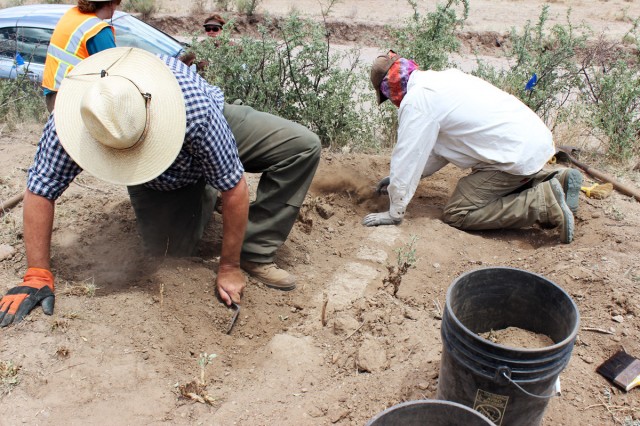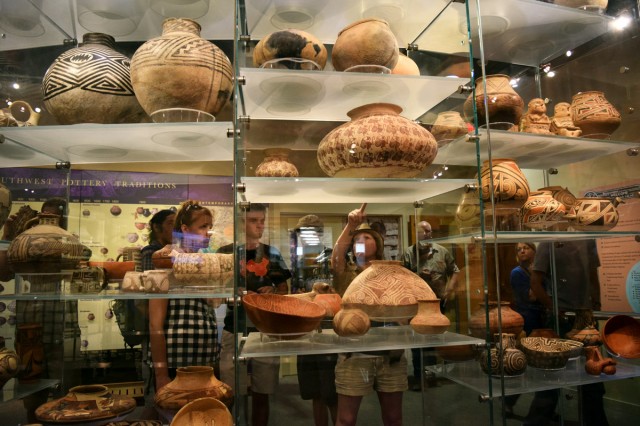- Home
- >
- Preservation Archaeology Blog
- >
- Attributes of the Successful Archaeologist: A Fiel...
Izzy Starr, Preservation Archaeology Field School Student
In every field of study, it seems as though there are certain sets of traits that tend to fare better than others. At the Preservation Archaeology Field School, I have had the opportunity to observe archaeologists at work, and now I have some speculations as to the characteristics that best complement the archaeological environment.
In archaeology, everyone has a focus. And what one person might find scintillating, another might find incredibly dull. From what I have witnessed, one of the most frequent questions an archaeologist might be asked (and one that isn’t at all rude) is: “Are you the one who is obsessed with…?” And you fill in the blank. Angular shatter, perforated plates—you name it, and someone, somewhere, will find it fascinating.
You must have passion, drive, curiosity, and critical thinking skills. Given the opportunity, it seems that archaeologists could debate migration patterns, potsherds, and lithic fragments for hours, jumping from topic to topic. Curiosity and critical thinking result in an immense amount of knowledge about a wide range of subjects that apply to many different subfields. An archaeologist with an interest in ceramics, while knowing the intricacies of his own subject, will also be aware of the ways in which his interests overlap with others’ foci.

Archaeology is not an individual effort—you have to be a team player. If only one person were excavating a unit at one time, it would take forever to go through the many steps of excavation—digging, screening, mapping, paperwork, and many more. A team setting allows individuals to collaborate and put together a comprehensive understanding of a site (and amplify the overall nerdiness) as individuals apply their specialties to different aspects of a problem. As an archaeologist in training, I am benefitting from getting to know the different people involved with our project: some have an interest in stone tools, some in ceramics, and some are just excited to get experience and dig.
Archaeological sites (and sights) can be found around the world, and evidence of an archaeologist’s passion can be found in their passport. Every archaeologist seems to have been dosed with wanderlust and curiosity about people in the past. Many of the other students here have had opportunities to work on previous field schools in Virginia, Belize, Arizona, and New Hampshire (me!), to name a few.
Archaeology can be tedious—let me tell you, it is no simple task to spent hours slaving in the hot New Mexican sun to unearth adobe architecture and Cliff phase (A.D. 1300–1450) artifacts. It is incredibly important for an archaeologist to be patient when excavating or when shaking excavated dirt through window screens, searching for tiny artifacts.
One of the most important traits of a successful archaeologist, I think, is a good sense of humor. Although fieldwork is knowledge- and skills-based, it is also based on interaction and bouncing ideas off one another. A crew that laughs together digs well together. Off-hours in the field are spent in one another’s company, relaxing, flintknapping, swapping stories, and laughing about past archaeological field experiences. On my next field project, I’ll have this summer’s stories to tell.

9 thoughts on “Attributes of the Successful Archaeologist: A Field Study”
Comments are closed.
My professor always said if you can’t handle working with a lot of people, you shouldn’t do archeology. Humor is absolutely necessary!
A good friend and great colleague of mine is fond of telling people, when they ask what it’s like being an archaeologist, “The dirt’s hard, the buckets are heavy, and the wind blows. And it’s hot. Except when it’s not, then it’s cold.” If you think you can handle all that and still be interested in what is or is not coming from your 1×1, you might make an archaeologist.
Great post! I think it’s incredibly important to emphasize the importance of being a team player. It’s really easy to get stuck in the idea of being a “specialist” or an “expert” in one or a few things. After all, we still deal with people even if their our colleagues. Also humor is critical in this profession. You have to learn how to laugh at situations and at yourself now and again.
It is nice to think that people feel that humor is considered an integral part of being an archaeologist. I don’t know. I’ve met more than a few humorless archaeologists and they were not fun to be around. But they still managed to make a contribution to the field. However, if you don’t expect to become rich, are interested in history, love to analyze “things”, love to read, can put up with the heat/cold/wind, don’t mind gnats (and other nasty critters), like meeting a true cross-section of nerds, and truly enjoy the prospect of uncovering something that no one has seen in two thousand years, then archaeology might be for you.
best quality to have is definitely sense of humor!!!
Great post! In general terms,sense of humor is the most important quality.
Great post! Critical thinking skillls is necessary for an archaeologist.
i want to be an archaeologist ever since I was 8 now im 13 and I still want to be one.
I wanted to be an Archaeologists since I was 12 now I’m 20 studying Archaeology in the University, ready to achieve it